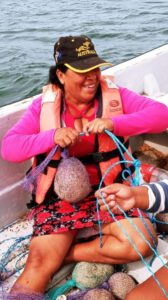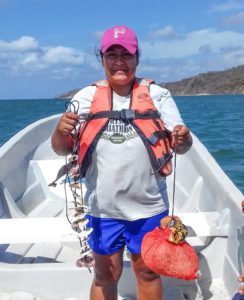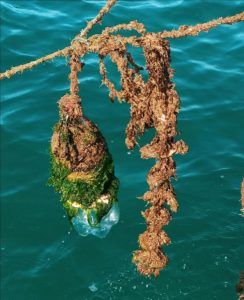
Oysters keep the oceans healthy. They filter up to 50 gallons of ocean water a day and form banks with their shells, giving habitat and protection! Without them, seawater is more polluted, coasts erode more easily, and there is less habitat for sea life.
With your support and with generous funding from the PRBB Foundation, the oyster cooperative in the village of Pochote has made great strides for oysters and more. The aim of the oyster program is two-fold: to restore coastal ecosystems and to elevate women fishers through leadership and income from sustainable aquaculture. In the last two years, the women fishers have learned boating and swimming skills, strengthened their fishing cooperative through regular meetings and legal support, and improved their livelihoods through selling oysters and poultry.
Earlier in the program, the women harvested very small oysters from the coastline and placed them in bags hung from open-ocean long-lines. The oysters grew there into market-sized products.
This approach was a good start, but it was limiting because it did not help restore the oyster beds or generate a profitable volume of oysters.
Therefore, during the past year, the women have focused on monitoring wild populations of tropical rock oysters (Striostrea prismatica). Their goal has been to understand the timing of oyster reproduction to eventually capture a portion of the wild larvae, organisms that are otherwise mostly lost to the sea. Using local materials, the women built buoys and set up 36 collectors along 3 lines suspended in the water. We couldn’t be more proud of their work.
Collectors are simply a batch of seashells in a bag that can attract oyster larvae and help bring these mollusks to the next stage of development. While the larvae are microscopic, regular sampling helps us know their presence and abundance.

Over the past year, women have been visiting the long-lines weekly, removing algae and other growth from the linds and taking a sample. Paso Pacifico’s biologist Osmar Sandino reviews samples collected by the women using microscopes at the UNAN-Leon laboratory. Over time, monitoring and additional oyster farming equipment will enable the women to grow more oysters on their ocean farms.
The oyster program has grown gradually through the years. Donors like you have been part of their journey, and so have foundations including the Waitt Foundation, the Loyal Bigelow and Jedediah Dewey Foundation, and more recently the PRBB Foundation. Our commitment to supporting these women remains strong. We couldn’t be more grateful for our donors, and we know that the women fishers are thanking you too.
Photos: Hal Brindley, Yorlin Vargas, and Julio Collado.

